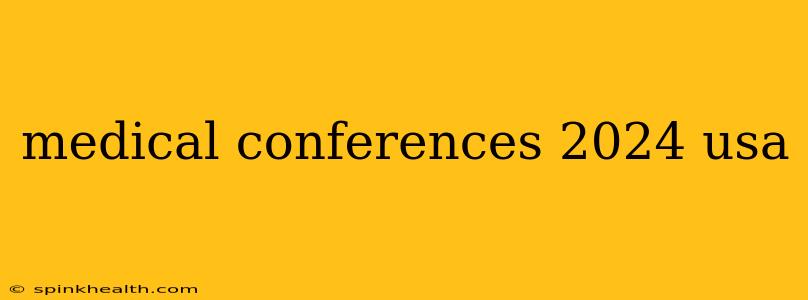The year is 2024. My overflowing inbox buzzes with invitations – the annual pilgrimage to medical conferences is upon us! As a seasoned physician, I've attended dozens, from intimate workshops to sprawling international gatherings. This year promises to be no different, and I thought I’d share my insights on navigating the world of US medical conferences in 2024 and beyond. Finding the right conference can be a challenge, so let's explore some key aspects to consider.
What Types of Medical Conferences are There in the USA?
The sheer variety is astounding! You'll find conferences hyper-focused on niche specialties, like pediatric cardiology or geriatric oncology, alongside broader events encompassing internal medicine, surgery, or public health. Some conferences are research-heavy, dedicated to the dissemination of new findings and groundbreaking studies. Others prioritize practical application, offering hands-on workshops and interactive sessions to enhance clinical skills. The scale also varies dramatically, from small, regionally focused events to massive gatherings drawing thousands of attendees from around the globe.
How Do I Find Medical Conferences in the USA for 2024?
The search can feel overwhelming, but it's manageable with the right approach. I usually start with professional organization websites. The American Medical Association (AMA), specialty boards (like the American College of Cardiology or the American Academy of Pediatrics), and other relevant professional societies maintain comprehensive calendars of events. Then, I delve into online search engines. Keywords like "medical conferences 2024 USA," along with your specific area of interest (e.g., "cardiology conferences 2024 California"), significantly refine the results. Don’t forget to check industry publications and journals – many advertise upcoming conferences.
What are the Top Medical Conferences in the USA in 2024? (And How to Choose)
Pinpointing the "top" conferences is subjective; it depends heavily on your specialty and career stage. However, some consistently rank highly for their size, reputation, and quality of speakers and content. For example, large, established organizations like the Mayo Clinic often host highly-regarded events. When choosing, consider these factors:
- Relevance to your specialty: Does the conference focus on your core area of expertise, or provide valuable insights into related fields?
- Speakers and faculty: Review the speaker lineup. Are they leading experts in their field? Do their presentations align with your learning goals?
- Location and accessibility: Consider the conference location's accessibility and your travel budget.
- Cost and value: Balance the registration fee against the potential benefits (e.g., continuing medical education credits, networking opportunities, and access to new research).
- Format and learning style: Prefer hands-on workshops or lectures? Does the conference offer the type of learning experience that best suits you?
Are there Free Medical Conferences in the USA?
While many conferences carry a substantial registration fee, some organizations offer free or reduced-cost access to certain events, especially for trainees, students, or those from under-resourced communities. Check conference websites carefully for scholarship opportunities or financial aid programs. Many organizations prioritize making medical education accessible to everyone.
How Do I Maximize the Benefits of Attending Medical Conferences?
Attending a conference isn't merely about passive listening. Active engagement is crucial. I always:
- Review the program in advance: Identify sessions most relevant to my interests and create a personalized schedule.
- Network strategically: Attend social events, introduce myself to speakers and colleagues, and initiate conversations.
- Take detailed notes: Don’t rely solely on handouts; capturing key takeaways in your own words improves retention.
- Follow up after the conference: Connect with colleagues on professional networking platforms, and incorporate new knowledge into your practice.
What are Some Key Considerations for International Attendees Attending Medical Conferences in the USA?
For international colleagues, extra planning is essential. This includes visa requirements, travel arrangements (flights and accommodation), healthcare insurance, and currency exchange. Remember to check the specific visa requirements well in advance; the process can take several weeks or even months.
Medical conferences are essential for professional development and staying abreast of advancements in the field. By approaching the selection and participation strategically, you can transform them into invaluable opportunities for personal and professional growth. The journey to selecting the perfect conference might seem daunting, but with a well-structured approach, the rewards are immeasurable. So, buckle up, and let's navigate the exciting world of medical conferences together!

